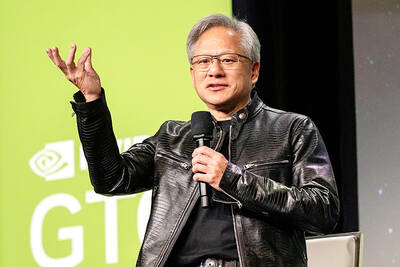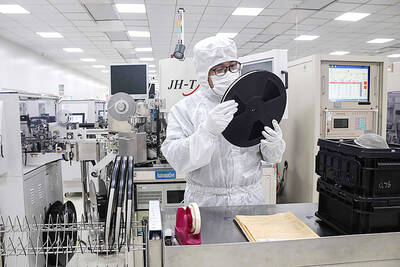Tesla Inc’s stock shot up nearly 12 percent in pre-market trade yesterday, a day after it forecast surging car sales growth, reassuring investors that CEO Elon Musk is still looking to expand the company’s core business of selling electric vehicles (EVs).
Musk has been pivoting Tesla into an artificial intelligence (AI) and robotics company from an EV market leader, but has so far failed to lay out a detailed business plan for his new focus.
On Wednesday, the company reported third-quarter profits of US$2.2 billion, up 17.3 percent from a year earlier, as well as an 8 percent increase in revenue to US$25.2 billion.

Photo: Bloomberg
The outspoken Musk offered a bullish outlook on Tesla’s prospects, pointing to the strong results as evidence the company’s ambitious vision is being realized.
“Tesla is focused on building the future of energy, transport, robotics and AI, and this is a time when others are just focused on managing around near-term trends,” Musk said on an earnings call.
He forecast 20 to 30 percent sales growth next year and said efforts to slash production costs would boost margins.
“He definitely seemed more passionate and invested in it this time,” said Jessica Caldwell, head of insights at car research and buying Web site Edmunds.
“I feel like so much of Tesla is tied up in the future, but we need to figure out how you get there. That’s what people needed to hear and they were a little bit better in providing those details than they have been in the past,”Caldwell said.
The results followed a flashy event this month to unveil a two-seater robotaxi dubbed Cybercab that would go into production in 2026 without a steering wheel or pedals and cost less than US$30,000 to buy. The event also featured a 20-seat driverless van and humanoid robots that danced for attendees.
Disappointed by the lack of some key details on how quickly Tesla could ramp up robotaxi production and clear inevitable regulatory hurdles, investors punished the company’s stock after that event.
Musk on Wednesday said Tesla aims to produce at least 2 million Cybercabs a year and expected Tesla vehicles to offer paid, driverless, ride-hailing services next year, doubling down on his promise made at the robotaxi event. He said the company was already testing the operations with its employees in the San Francisco Bay Area.
However, that plan is likely to face significant regulatory challenges.
Musk himself acknowledged on Wednesday the potential difficulties in getting approvals in California, saying “it’s not something we totally control,” but adding: “I would be shocked if we don’t get approval next year.”
For now, encouraging fundamentals of the core EV business are likely to keep the heat off Musk. Until next quarter.
“Capturing sales in today’s challenging market and streamlining operations aren’t as sexy as self-driving cabs and dancing robots,” Caldwell said. “But they’re critical toward funding the company’s long-term vision for the future.”
Additional reporting by AFP

‘DECENT RESULTS’: The company said it is confident thanks to an improving world economy and uptakes in new wireless and AI technologies, despite US uncertainty Pegatron Corp (和碩) yesterday said it plans to build a new server manufacturing factory in the US this year to address US President Donald Trump’s new tariff policy. That would be the second server production base for Pegatron in addition to the existing facilities in Taoyuan, the iPhone assembler said. Servers are one of the new businesses Pegatron has explored in recent years to develop a more balanced product lineup. “We aim to provide our services from a location in the vicinity of our customers,” Pegatron president and chief executive officer Gary Cheng (鄭光治) told an online earnings conference yesterday. “We

It was late morning and steam was rising from water tanks atop the colorful, but opaque-windowed, “soapland” sex parlors in a historic Tokyo red-light district. Walking through the narrow streets, camera in hand, was Beniko — a former sex worker who is trying to capture the spirit of the area once known as Yoshiwara through photography. “People often talk about this neighborhood having a ‘bad history,’” said Beniko, who goes by her nickname. “But the truth is that through the years people have lived here, made a life here, sometimes struggled to survive. I want to share that reality.” In its mid-17th to

‘MAKE OR BREAK’: Nvidia shares remain down more than 9 percent, but investors are hoping CEO Jensen Huang’s speech can stave off fears that the sales boom is peaking Shares in Nvidia Corp’s Taiwanese suppliers mostly closed higher yesterday on hopes that the US artificial intelligence (AI) chip designer would showcase next-generation technologies at its annual AI conference slated to open later in the day. The GPU Technology Conference (GTC) in California is to feature developers, engineers, researchers, inventors and information technology professionals, and would focus on AI, computer graphics, data science, machine learning and autonomous machines. The event comes at a make-or-break moment for the firm, as it heads into the next few quarters, with Nvidia CEO Jensen Huang’s (黃仁勳) keynote speech today seen as having the ability to

The battle for artificial intelligence supremacy hinges on microchips, but the semiconductor sector that produces them has a dirty secret: It is a major source of chemicals linked to cancer and other health problems. Global chip sales surged more than 19 percent to about US$628 billion last year, according to the Semiconductor Industry Association, which forecasts double-digit growth again this year. That is adding urgency to reducing the effects of “forever chemicals” — which are also used to make firefighting foam, nonstick pans, raincoats and other everyday items — as are regulators in the US and Europe who are beginning to